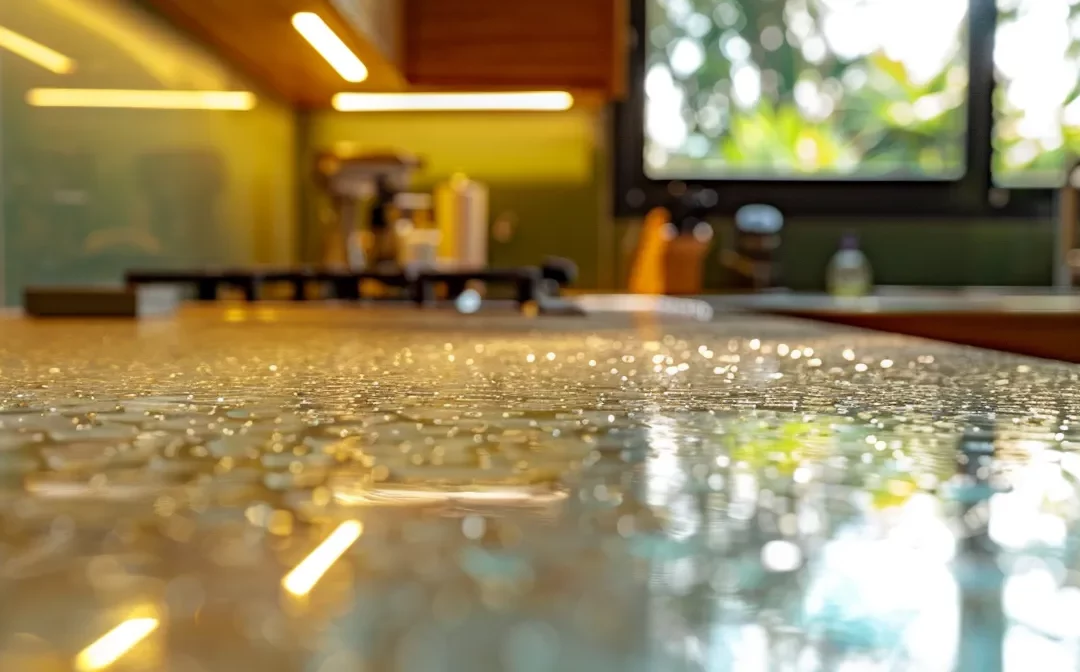Green Kitchen Innovations: Sustainable Materials Redefining Home Design
The demand for sustainable kitchen renovations is transforming home design, as homeowners increasingly seek to combine style with eco-conscious choices. From marble countertops that are sustainably sourced to innovative kitchen remodeling techniques that prioritize water conservation, the landscape of kitchen design is evolving. The HIA Website highlights a variety of materials and solutions that meet these growing needs, ensuring that personal aesthetics align with environmental responsibility. Embracing green innovations not only enhances the kitchen’s functionality but also makes a positive impact on the planet. As technology advances, options for eco-friendly kitchen appliances and fixtures continue to expand, paving the way for a more sustainable future. Keep reading to explore these exciting developments that are redefining kitchen spaces.
Key Takeaways
- Choosing sustainable materials enhances both kitchen aesthetics and environmental responsibility
- Energy-efficient appliances play a crucial role in reducing household energy consumption
- Innovative designs, like biophilic and minimalist concepts, promote eco-friendly kitchen environments
- Low-flow fixtures and recycled materials contribute significantly to sustainable kitchen renovations
- Proper lighting choices can optimize energy use and enhance kitchen ambiance
Embracing Sustainable Materials in Kitchen Design
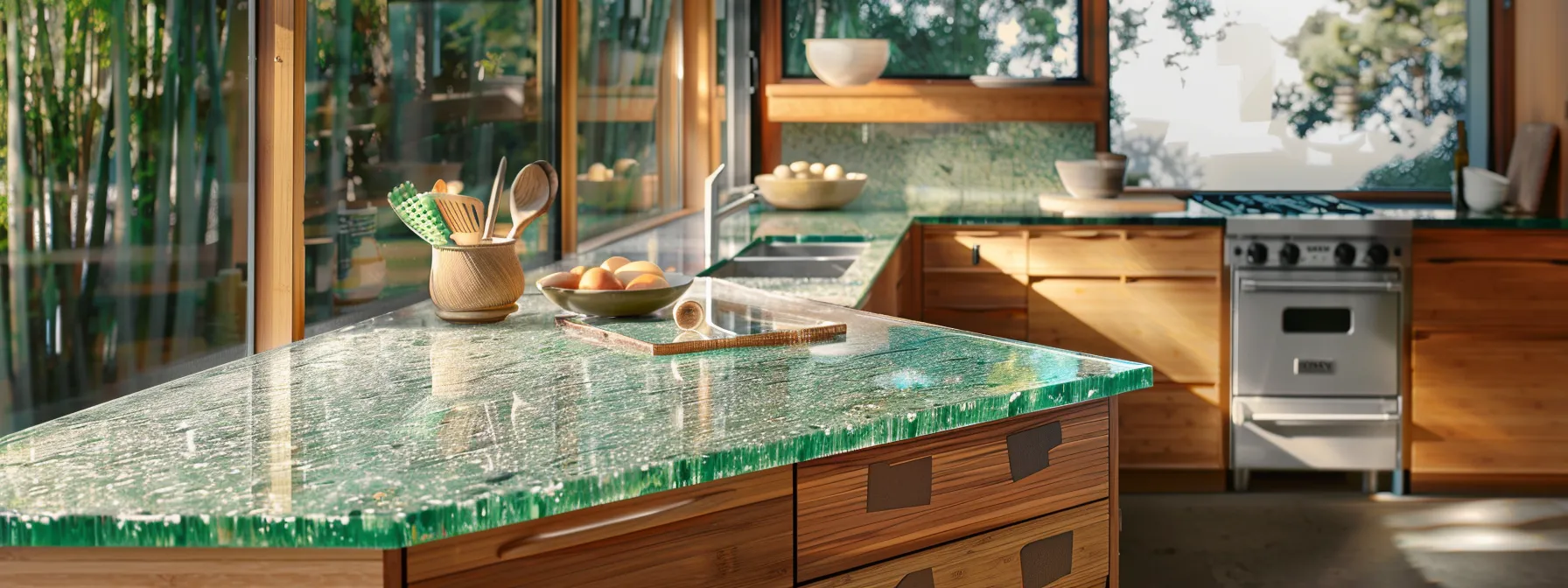
Sustainable materials have increasingly become a focal point in kitchen design, driving innovation and practicality in remodeling projects. By selecting eco-friendly building blocks, homeowners can create a kitchen space that reflects both style and responsibility. Recycled glass countertops offer a unique aesthetic along with durability, making them a favorable choice over conventional granite surfaces. Bamboo, known for its rapid growth and low environmental impact, presents a sustainable alternative for cabinetry and tableware. Incorporating reclaimed wood not only adds a rustic charm but also reduces the demand for new lumber. Additionally, innovative composite materials are reshaping the perception of green kitchens, providing modern solutions without compromising quality. The resurgence of cork flooring stands as a testament to both sustainability and design, further enhancing the eco-conscious kitchen. Each of these elements represents a step towards a more sustainable future, marrying functionality with aesthetic appeal.
Choosing Eco-Friendly Building Blocks
In the quest for sustainable living, selecting eco-friendly building blocks is essential for achieving a functional kitchen that promotes sustainable design. Homeowners should prioritize sustainable products that not only reduce environmental impact but also enhance the brightness and style of the space. Thoughtfully chosen green building materials create an inviting atmosphere while supporting a healthier planet. For more information, visit the HIA Website.
- Prioritize sustainable materials such as recycled glass and bamboo.
- Incorporate reclaimed wood for a unique aesthetic.
- Opt for innovative composite materials for durability and function.
- Utilize cork flooring to add both style and eco-friendliness.
- Focus on products that promote energy efficiency and long-term sustainability.
Advantages of Recycled Glass Countertops
Recycled glass countertops present a remarkable advantage in reducing the carbon footprint associated with kitchen renovations. By utilizing materials that repurpose waste glass rather than relying on energy-intensive processes to produce new surfaces, homeowners can make a significant impact. Additionally, these countertops are available in a variety of hues, allowing for personalized designs that complement other elements, such as stainless steel appliances, while remaining eco-conscious.
Incorporating recycled glass countertops into a kitchen remodel not only enhances aesthetic appeal but also promotes sustainability. The energy savings from using such materials can be complemented with features like compost stations, encouraging environmentally friendly habits in everyday cooking and food preparation. This combination makes for a design that prioritizes both visual harmony and ecological responsibility.
Bamboo: The Fast-Growing Sustainable Choice
Bamboo stands out as an exemplary choice for sustainable interior design, especially in kitchen spaces. Its rapid growth cycles and ability to thrive without the use of harmful pesticides align with ethical practices that prioritize environmental responsibility. From a farmhouse perspective, bamboo adds a unique aesthetic while minimizing waste, making it an ideal material for both rustic and modern kitchen designs.
- Bamboo offers rapid renewal rates, making it a sustainable resource.
- Its aesthetic versatility integrates effortlessly into various design styles.
- Using bamboo supports ethical sourcing and environmental stewardship.
- Contributing to waste reduction aligns with eco-friendly practices.
Incorporating Reclaimed Wood for a Rustic Look
Incorporating reclaimed wood into kitchen design offers a unique way to achieve a rustic look while promoting sustainability. Custom cabinets crafted from reclaimed timber not only showcase stunning natural variations but also harmonize beautifully with modern elements like stainless steel appliances. Advancements in automation and design intelligence allow homeowners to integrate sensors for efficient lighting and climate control, enhancing functionality and complementing the warm aesthetics of reclaimed wood.
Innovative Composite Materials for Green Kitchens
Innovative composite materials are transforming the landscape of sustainable kitchens by combining style and functionality. Materials such as recycled plastics and biocomposites deliver striking designs that can serve as an accent wall or complement a modern stove, all while prioritizing the natural environment. These options not only cater to the taste of discerning homeowners but also act as an engine for sustainability through their environmentally responsible production methods.
- Recycled plastics enhance design while supporting eco-friendly practices.
- Biocomposites combine aesthetics with sustainable sourcing.
- These materials can be used for accent walls or kitchen fixtures.
- Homeowners enjoy stylish, functional designs that contribute to a healthier planet.
Why Cork Flooring Is Making a Comeback
Cork flooring is gaining renewed attention in kitchen design due to its unique combination of aesthetics and sustainability. As homeowners embrace the idea of a kitchen remodel, cork presents an intriguing option that encourages creativity while also mitigating greenhouse gas emissions. Its natural insulating properties make it a comfortable choice for standing by the cooktop during prolonged cooking sessions, enhancing the overall experience in the kitchen.
Key benefits of cork flooring include:
- Providing a soft underfoot surface, reducing strain during long cooking periods.
- Offering natural sound-dampening qualities, creating a quieter kitchen environment.
- Minimizing energy costs due to its insulation properties, thus lowering greenhouse gas emissions.
- Being harvested sustainably, aligning with eco-friendly practices in home design.
As homeowners prioritize sustainable materials in their kitchen designs, another trend is emerging on the horizon. Eco-friendly kitchen appliances are gaining traction, promising to enhance functionality while minimizing environmental impact.
The Rise of Eco-Friendly Kitchen Appliances
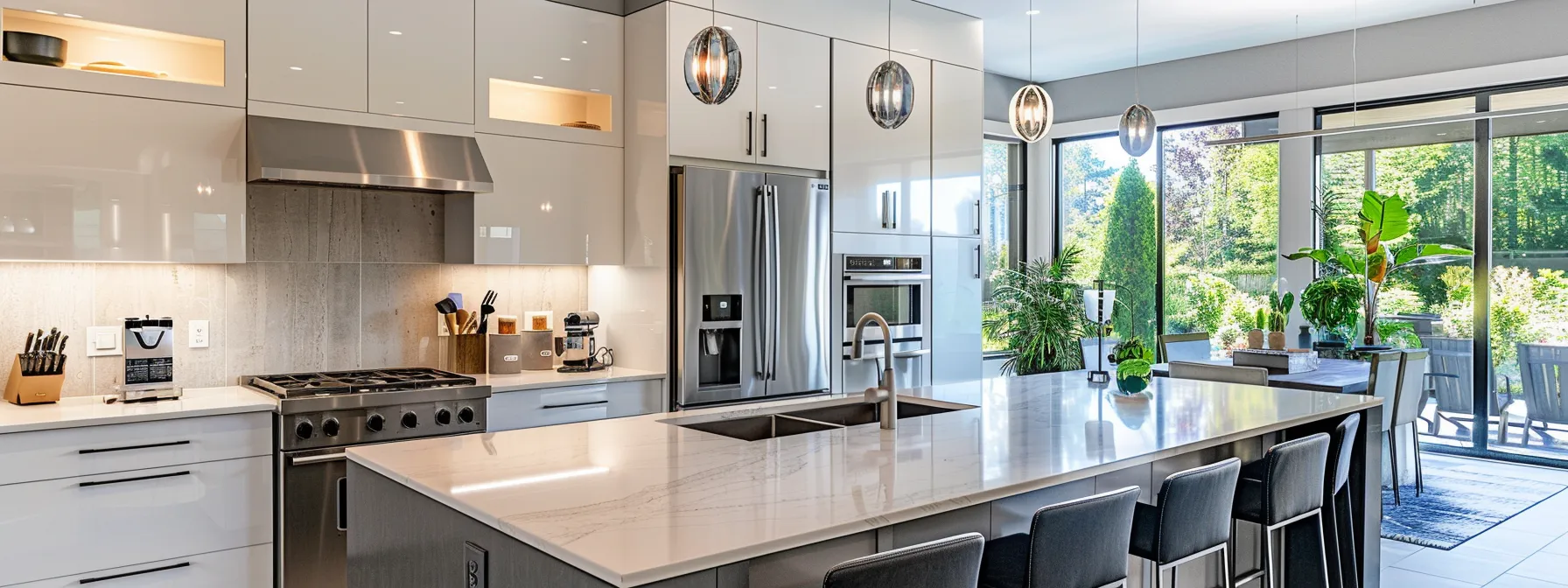
As the movement towards sustainability gains momentum in the realm of kitchen design, the choice of appliances plays a pivotal role in shaping a more environmentally conscious home. Energy-efficient refrigerators are starting to dominate the market with their ability to reduce energy consumption, directly benefiting the planet and a chef‘s culinary aspirations. Water-saving dishwashers emerge as key players, blending convenience with eco-friendly practices that resonate within modern culture. Additionally, modern cooking ranges incorporate enhanced efficiency features that appeal to both seasoned chefs and home cooks alike, catering to those who value sustainability without sacrificing performance. Induction cooktops stand out, offering rapid heating and energy conservation, thus embracing the grey area between high-end cooking and environmental responsibility. Furthermore, understanding the significance of Energy Star ratings guides homeowners in making informed decisions, ensuring appliances contribute meaningfully to a sustainable kitchen renovation.
Selecting Energy-Efficient Refrigerators
Selecting energy-efficient refrigerators represents a key component in sustainable kitchen design. These modern appliances often integrate the internet of things, allowing for real-time energy management and usage monitoring, which significantly reduces power consumption. Homeowners can complement their eco-friendly choices with materials such as charcoal, terrazzo, and sustainable lumber, enhancing both the aesthetic appeal and environmental responsibility of their kitchens.
Water-Saving Dishwashers for Sustainable Living
Water-saving dishwashers significantly enhance user experience by combining efficiency with ease of use. These advanced appliances consume less water, directly benefiting efforts to combat climate change while promoting sustainable living. Additionally, the construction of such dishwashers often involves materials like quartz, which not only improve durability but also support environmentally responsible manufacturing practices, making them accessible to a wider audience seeking eco-friendly kitchen solutions.
Modern Cooking Ranges With Enhanced Efficiency
Modern cooking ranges with enhanced efficiency are transforming kitchen dynamics, fostering a more environmentally conscious behavior among homeowners. These appliances not only excel in their cooking property but also evoke a sense of emotional connection through their sleek designs, often available in colors like emerald that can complement any kitchen wall. By seamlessly integrating functionality with aesthetic appeal, these ranges encourage a commitment to sustainability while enriching the overall culinary experience.
How Induction Cooktops Contribute to Energy Conservation
Induction cooktops represent a significant advancement in sustainable kitchen design, marrying beauty with functionality. This innovative machine utilizes electromagnetic energy to directly heat pots and pans, resulting in quicker boiling times and reduced energy consumption. By minimizing heat loss and optimizing efficiency, induction cooktops stand as a prime choice for homeowners aiming to create an eco-friendly culinary space.
The Importance of Energy Star Ratings
The significance of Energy Star ratings cannot be understated in the contemporary kitchen landscape. These ratings serve as a benchmark for energy efficiency, guiding homeowners towards appliances that balance sustainability with performance. Experts emphasize that selecting Energy Star-certified products not only reduces energy consumption but also influences social behavior, encouraging a collective shift towards environmentally responsible choices in home manufacturing, thereby reshaping the approach to modern kitchen palettes.
With eco-friendly kitchen appliances paving the way for greener living, the spotlight now shifts to another crucial aspect of sustainable design. Sustainable lighting solutions are illuminating modern kitchens, enhancing both functionality and environmental responsibility.
Sustainable Lighting Solutions for Modern Kitchens
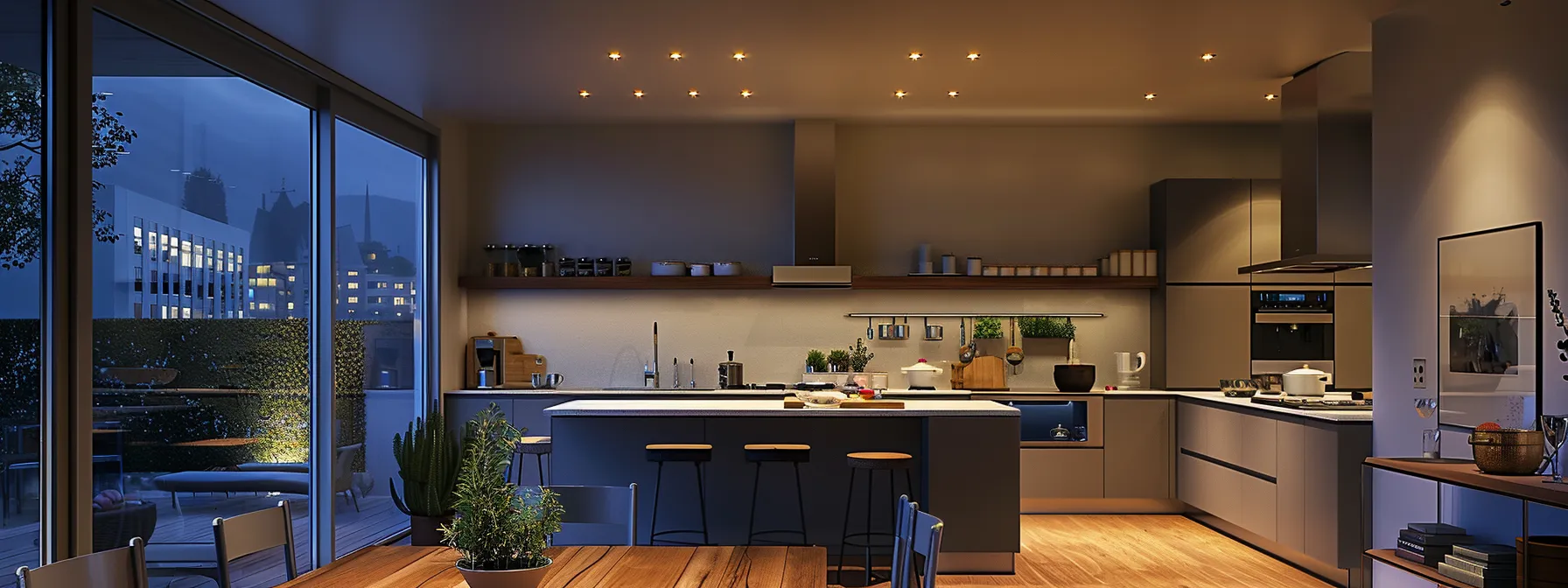
Modern kitchens are increasingly embracing sustainable lighting solutions that align with eco-friendly principles and bring aesthetic appeal. LEDs lead the charge, offering energy-efficient illumination that significantly reduces waste generated by traditional bulbs, ultimately minimizing contributions to landfills. Harnessing the benefits of natural light becomes essential, as it not only enriches the kitchen space but also promotes a healthier atmosphere. Innovations such as solar tube lights introduce creative ways to channel sunlight into interior areas, enhancing energy efficiency. Moreover, smart lighting systems integrated with mobile apps further enhance control over energy consumption, allowing homeowners to adjust settings seamlessly from their devices. These advancements reflect a comprehensive approach to kitchen design that not only opts for shades of green but also incorporates engineered stone materials, ensuring sustainability as a core value of modern living.
LEDs: The Future of Kitchen Illumination
LEDs have emerged as a prominent choice in modern kitchen design, aligning with the latest trends in energy efficiency and sustainability. These lighting solutions, crafted from materials such as aluminium and plastic, offer a sleek aesthetic while significantly reducing energy consumption. Consumers increasingly favor LED technology for its longevity and versatility, making it a practical addition to any room in the home that requires illumination.
The Benefits of Natural Light in Kitchen Spaces
Natural light significantly enhances kitchen spaces, transforming the overall perception of the room. By allowing sunlight to pour in, homeowners can uplift their mood and reduce the occurrence of “blues” often associated with darker environments. Moreover, utilizing natural light diminishes the reliance on artificial lighting, ultimately contributing to lower energy consumption and, consequently, a reduction in greenhouse gas emissions.
The infusion of sunlight also highlights the beauty of wood finishes and materials, creating a warm and inviting atmosphere. This connection to nature has prompted many designers to prioritize the reuse of materials that resonate with eco-friendly principles, enhancing both design and sustainability. By embracing natural light, kitchens become not just functional areas but also spaces that foster well-being and creativity.
Solar Tube Lights: An Innovative Lighting Solution
Solar tube lights present a forward-thinking solution for homeowners transitioning towards sustainable design. By capturing sunlight from the roof and channeling it downwards, these innovative installations not only illuminate kitchens effectively but also attract the attention of architects aiming to integrate eco-friendly principles into their designs. This approach helps optimize energy efficiency without compromising on style, providing valuable insight into modern lighting options that support Energy Star initiatives.
By integrating solar tube lights into kitchen designs, homeowners can elevate both functionality and environmental stewardship, transforming spaces that inspire and rejuvenate.
Smart Lighting Systems to Reduce Energy Use
Smart lighting systems not only enhance the aesthetic appeal of the kitchen but also play a vital role in increasing energy efficiency throughout the home. By integrating these systems into a space adorned with hardwood floors, such as oak, homeowners can optimize their lighting usage based on natural light availability and personal preferences, thereby reducing overall energy consumption. This approach not only promotes sustainable living but also contributes to a wealth of benefits, creating a more inviting environment that extends seamlessly into adjacent areas like the dining room.
Modern kitchens are embracing sustainable lighting not just for ambiance, but as a stepping stone towards greener innovations. Explore how the latest in kitchen fixtures is transforming functionality while championing environmental responsibility.
Green Innovation in Kitchen Fixtures
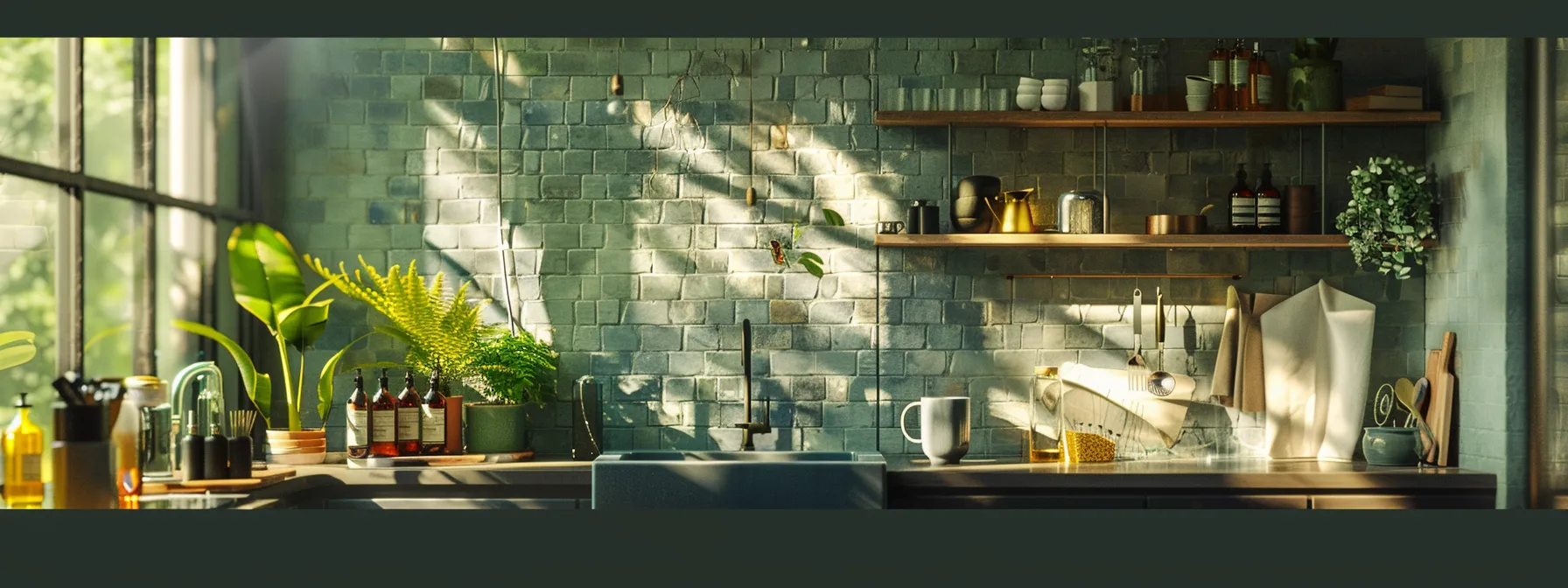
In the pursuit of a sustainable kitchen, innovations in fixtures are playing a crucial role in redefining home design. Low-flow faucets emerge as a key solution, significantly reducing water consumption without sacrificing performance. Homeowners now have a variety of eco-friendly material options for sinks, including durable choices made from recycled metal or terracotta, ensuring both functionality and stylish appeal. Advances in sustainable kitchen hardware further enhance this movement, harnessing innovations inspired by natural elements such as straw and wind. By integrating these green innovations, kitchen spaces become more sustainable while maintaining a commitment to quality and aesthetics.
Low-Flow Faucets to Conserve Water
Low-flow faucets present a practical solution for homeowners seeking to reduce their ecological footprint in the kitchen. By efficiently managing water flow during daily tasks like washing dishes or preparing meals, these fixtures minimize wasted water and contribute to significant energy savings related to water heating. Furthermore, many modern low-flow faucets are designed without harmful substances such as formaldehyde, making them an environmentally friendly choice that aligns with broader sustainable practices often discussed in both kitchen and bathroom renovations.
Eco-Friendly Material Options for Sinks
Eco-friendly material options for sinks have gained popularity, driven by research highlighting their ability to reduce carbon footprints and minimize air pollution. Manufacturers are now offering sinks made from sustainable materials such as recycled metal and bamboo composites, which not only contribute to environmental preservation but also enhance the kitchen’s aesthetic appeal. These innovative sinks enable homeowners to enjoy their meal preparations in a space that embraces sustainability while benefiting from the natural daylight that complements their kitchen design.
Advances in Sustainable Kitchen Hardware
Advancements in sustainable kitchen hardware are significantly influencing modern renovation approaches, emphasizing both innovation and eco-friendliness. By prioritizing products certified by the Forest Stewardship Council, homeowners can ensure that their choices support responsible forest management while also aligning with a healthy lifestyle. These innovative fixtures not only conserve essential resources and reduce environmental impact but also enhance the aesthetic appeal of kitchen spaces.
The advancements in green fixtures are just the beginning; the next step is seamlessly integrating these technologies into kitchen design. By combining innovative eco-friendly solutions with smart aesthetics, homeowners can create a sustainable culinary space that inspires both cooking and creativity.
Integrating Green Technology Into Kitchen Design
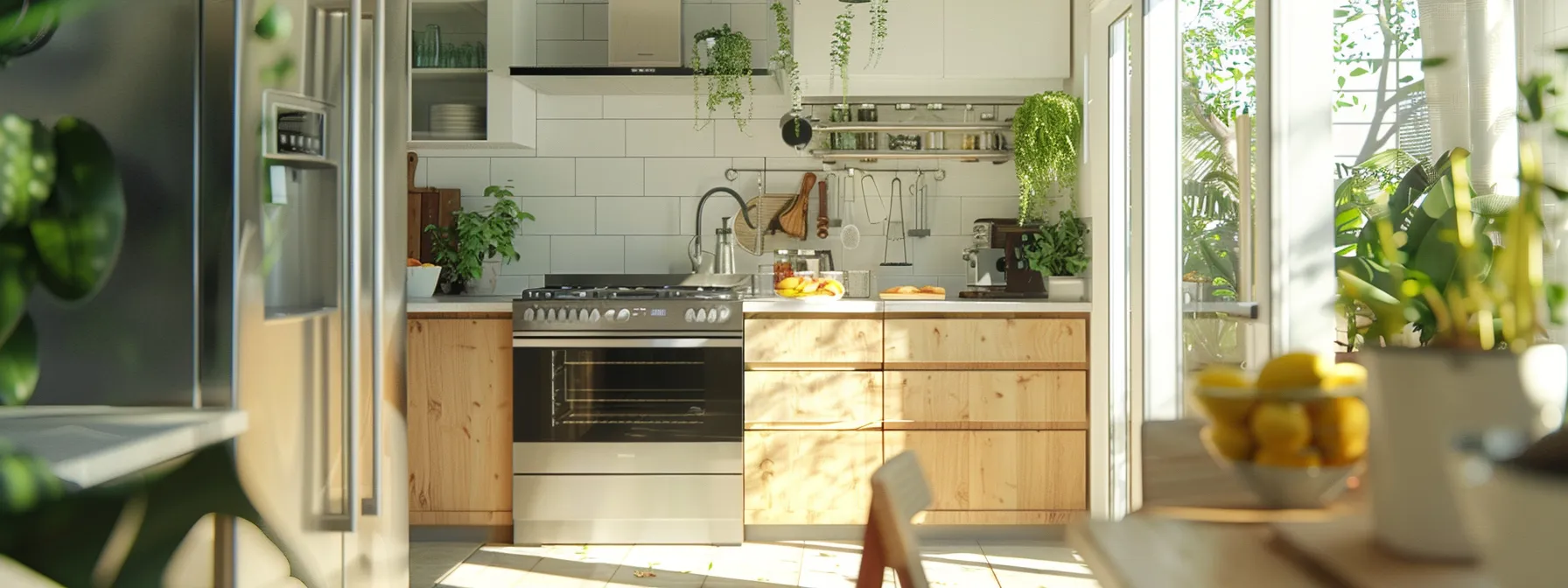
As modern kitchens evolve to incorporate sustainable practices, the integration of green technology plays a pivotal role in reshaping home design. Smart appliances equipped with energy-saving features streamline daily tasks while maximizing utility, allowing homeowners to make environmentally conscious choices. Additionally, the Internet of Things (IoT) provides innovative solutions for reducing kitchen waste by enabling real-time monitoring of food inventory and expiration dates. Automated systems that facilitate composting kitchen scraps further contribute to sustainability efforts, demonstrating leadership in waste management. By utilizing eco-friendly materials such as concrete countertops and plywood cabinets, homeowners can create spaces that reflect a commitment to both functionality and environmental responsibility.
Smart Appliances for a Sustainable Kitchen
Smart appliances are transforming kitchen environments by promoting efficiency and reducing waste, directly addressing various environmental issues. These advanced units offer features such as precise temperature controls for sinks and adaptive settings for countertops, enhancing both performance and sustainability. Brands that prioritize energy-efficient technology contribute to creating an atmosphere that reflects a commitment to environmental stewardship, appealing to eco-conscious consumers.
The Role of IoT in Reducing Kitchen Waste
The integration of Internet of Things (IoT) technology enhances kitchen management by monitoring food inventory and expiration dates. Home automation facilitates seamless tracking within the pantry, reducing waste through timely notifications for food items that require consumption. This proactive approach not only contributes to effective waste management but also ensures improved indoor air quality and food hygiene across kitchen spaces.
- Real-time monitoring of food inventory prevents spoilage.
- Automated notifications encourage timely consumption.
- Home automation optimizes pantry management.
- Enhanced hygiene standards result from better food practices.
- Indoor air quality improves through reduced waste odors.
Automated Systems for Composting Kitchen Scraps
Automated systems for composting kitchen scraps play a significant role in promoting a sustainable kitchen by minimizing food waste and reducing pollution. These innovative solutions enhance the usability of kitchen spaces, allowing homeowners to efficiently manage organic waste, such as olive pits and vegetable peels, while simultaneously decreasing their environmental footprint. By integrating technology into composting practices, families can contribute to a healthier planet and foster eco-friendly habits within their households.
Innovative designers are constantly pushing the boundaries of sustainability in kitchen design. The future holds even more exciting developments that will redefine how kitchens function and interact with the environment.
Future Trends in Sustainable Kitchen Design
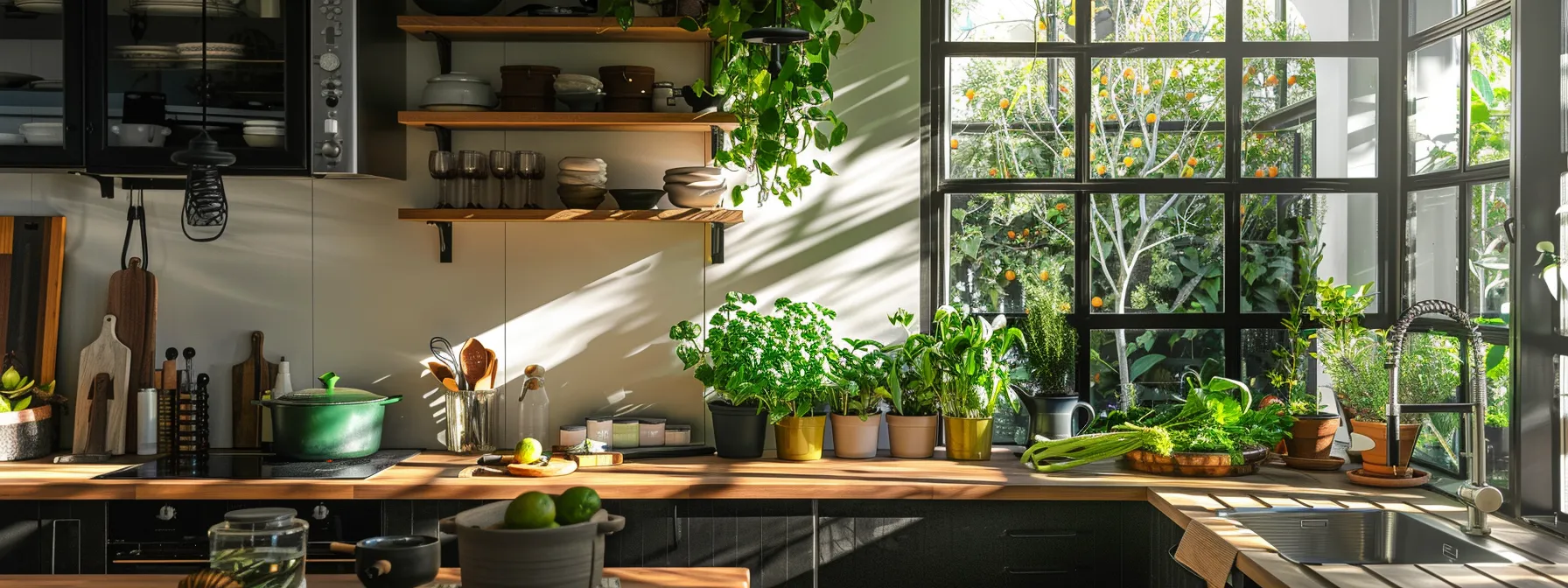
As the movement towards sustainable kitchen design continues to gain momentum, several innovative concepts are emerging to shape the future of the space. Biophilic design prioritizes a strong connection between kitchens and nature, integrating elements that leverage natural light and greenery to enhance both aesthetics and well-being. The idea of zero-waste kitchens is on the rise, encouraging homeowners to implement recycling practices and optimize the use of renewable energy sources throughout their cooking and cleaning processes. Minimalism, characterized by its efficient use of space and reduction of clutter, is influencing kitchen layouts and storage solutions, including the choice of kitchen cabinets and dishwashers that emphasize functionality while maintaining a deep green ethos. These trends reflect a holistic approach to kitchen design that harmonizes environmental responsibility with practical living solutions.
Biophilic Design: Connecting Kitchens With Nature
Biophilic design emphasizes the integration of natural elements into kitchen environments, creating a space that fosters a connection with the outdoors. By incorporating features such as a cork floor, a tasteful kitchen hood that mimics organic forms, and strategically placed drawers that flow harmoniously with the overall aesthetic, designers enhance both functionality and visual appeal. This approach not only elevates the kitchen’s atmosphere but also contributes to environmental protection, reflecting a commitment to sustainability in every element of the design.
Zero-Waste Kitchens: A Vision for the Future
Zero-waste kitchens represent a transformative vision where every element contributes to sustainability. By incorporating durable, eco-friendly materials like linoleum for countertops and flooring, homeowners can create spaces that not only look striking but also minimize waste. Pairing this with a rich midnight blue cabinetry can enhance the visual appeal while promoting a commitment to reducing environmental footprints.
The Impact of Minimalism on Sustainable Kitchen Design
Minimalism significantly influences sustainable kitchen design by prioritizing efficiency, simplicity, and intentionality. This approach encourages homeowners to select fewer, but higher-quality materials and fixtures that serve multiple functions, ultimately reducing waste and promoting mindful consumption. By creating uncluttered spaces that focus on essential elements, minimalism aligns seamlessly with the principles of sustainability while enhancing both aesthetic appeal and overall functionality.
